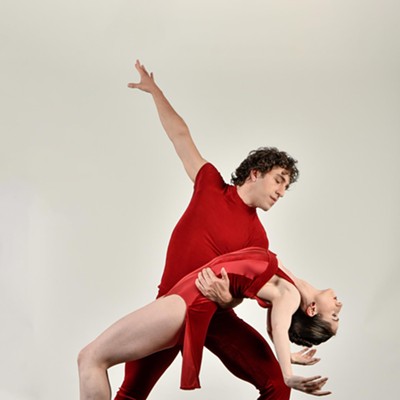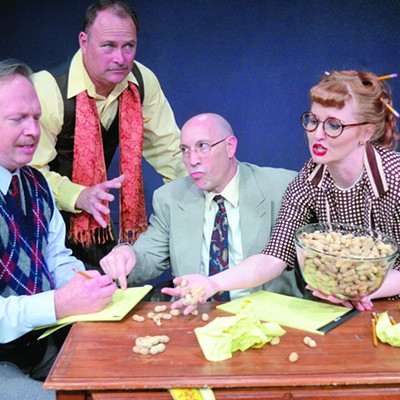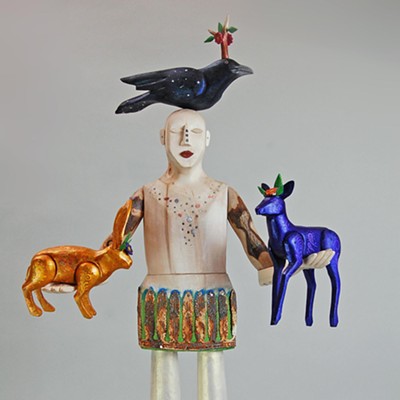A Collaborative Experience
The 19th Annual New Play Festival
7:30 p.m., Thursday-Saturday, Feb. 25-27; 1:30 p.m., Sunday, Feb. 28
Temple of Music and Art Cabaret Theater
330 S. Scott Ave.
297-3317;
Each week, about 20 people gather to critique each other's work. This is learning.
The Old Pueblo Playwrights give a forum to Arizona playwrights, to help them get an idea of what needs to be done in order to see their plays get produced.
Gavin Kayner never really meant to be a playwright, he said. But somehow, his love for and training in poetry evolved into an interest in children's literature—and finally into plays and screenwriting.
"Writing is just an obsession of mine," Kayner said. "It's where I thrive, and I know it works for me, and I miss it when I don't write for a while."
This prompted him to check out Old Pueblo Playwrights after seeing a notice for the group in a newspaper. OPP is a collaborative organization that seeks exposure and feedback for Arizona's playwrights.
OPP has put on the annual New Play Festival for the last 19 years. The playwrights vote on the plays they have been reading at their weekly gatherings, and the winning plays are produced during the festival as "reader's theater," with scripts in actors' hands, and minimal staging and props.
Kayner has been a member of OPP for the last eight years and has participated in each festival as a writer, an actor, a director or in another capacity. This year, his The Language of Flowers will be performed on the first day of the festival.
"I am pretty happy with this play," Kayner said. "I want my plays to be entertaining, but also when people leave the theater, I want them to think."
Admission is $7 per performance; an all-festival pass is $20. —S.F.
Chance to Change Lives
Peace Corps Fair
4 to 7 p.m., Tuesday, March 2
UA Student Union Grand Ballroom
1303 E. University Blvd.
414-8803;
grad.arizona.edu/peacecorp/pcweek
After four years in Zambia as a member of the U.S. Peace Corps, Lauren Schroeder found her native California to be strangely foreign.
"Grocery stores were overwhelming, and there seemed to be so much concrete everywhere," she said.
Her main project was to be an HIV-education volunteer, she said. "However, the main concern was water and sanitation."
Schroeder said she had never built a well before, but she was determined to help the people of the rural village in which she was stationed.
"I've always been good at meeting people and networking," she said. "So I found Zambians who knew how to build wells, and I brought them to my area."
The Zambians in Schroeder's region spoke a native dialect called Bemba, a language Schroeder was unfamiliar with when she arrived.
"The people in my area didn't speak any English at all, so it was kind of sink or swim," she said. "The Peace Corps curriculum is very good. By a year, I was close to fluent."
However, there were still times where she experienced a slip of the tongue.
"I remember once when some locals were building a garden behind a house," she said. "I tried to tell them I wanted to help, but they thought I was saying, 'I want to die.'"
Schroeder said the people she met during her first two years in the Peace Corps had a dramatic impact upon her life.
"When I came back to visit, it was this huge warm familial welcoming. The villagers dropped everything they were doing, and I started crying," she said. "Zambians only cry when someone dies, so I had to tell them I was crying because I was so happy."
Admission to the UA Peace Corps Fair is free. —W.F.
A Taste of Mexican Cinema
Tucson Cine Mexico 2010
Thursday, March 4, through Sunday, March 7
Most screenings at Harkins Tucson Spectrum 18
5455 S. Calle Santa Cruz
626-9825;
In 1978, the daughter of the revolutionary Mexican President Plutarco Elias Calles (1877-1945) recorded six audio tapes with the intention of making a biography of her father's life.
More than 30 years later, Calles' great-granddaughter, Natalia Almada, integrated the recordings into El General, a documentary film that explores the life of her great-grandfather.
Almada, the recipient of the Documentary Directing Award at the 2009 Sundance Film Festival, will be making her way to Tucson for the Arizona premiere of El General.
Her great-grandfather left behind a legacy of both civil reform and brutal persecution of the Catholic Church. Almada said the film explores the relationship between her grandmother's memories of Calles and how he is viewed in Mexico today.
"When you look at modern Mexico, it is very difficult to not reflect upon what was fought for in the revolution," said Almada. "I am questioning how history is written ... My interest is not saying which is more true, but rather looking at that contradiction."
Almada said one great challenge in showing her documentary to non-Mexican audiences is the cultural gap.
"There is a statue in the film that has significance for Mexican audiences but not for American ones," she said. "If you want to make an association for an international audience to understand, you have ... to make those things clear."
Almada's documentary is one of eight acclaimed Mexican films that will be featured as part of Tucson Cine Mexico 2010. El General will be screened, with Almada present, at 6 p.m., Thursday, March 4, at the Harkins Tucson Spectrum 18.
Admission to all Cine Mexico films is free; visit the Web site for a complete schedule. —W.F.
A New Light
Chinese Lantern Festival
1 to 4 p.m., Saturday, Feb. 27
Tucson Children's Museum
200 S. Sixth Ave.
792-9985;
The colorful puppet swings through the air, making seemingly impossible arcs and dips, and creating rivulets in the fabric as the legs poking out from underneath dance in time.
The traditional lion dance is just one part of the Tucson Children's Museum's annual Chinese New Year celebration.
"These festivals have always been a great opportunity to partner with associations in our community and to share (those associations) with visitors," said Peggy Solís, of the Children's Museum. "We don't want to do a festival where we read out of a book; we'd rather have a group come and share their culture and activities."
Other activities at the celebration will include lantern-making and martial arts.
Each year, the museum partners with the Tucson Chinese Association to bring culture and tradition to the masses of Tucson during Chinese New Year.
"We're here to promote and educate the community at large," said Susan Chan, the association's treasurer. "We've been here (more than) 60 years."
The association holds classes at the Chinese Cultural Center in dancing, martial arts, performing arts and more, in an effort to continue building awareness of the Chinese presence in Tucson.
The Children's Museum is committed to drawing the community out to such events; this is just one special day in a series of multicultural celebrations, called Festival of Friendship, that the museum will be having.
Admission to the Chinese Lantern Festival is $2. —S.F.







